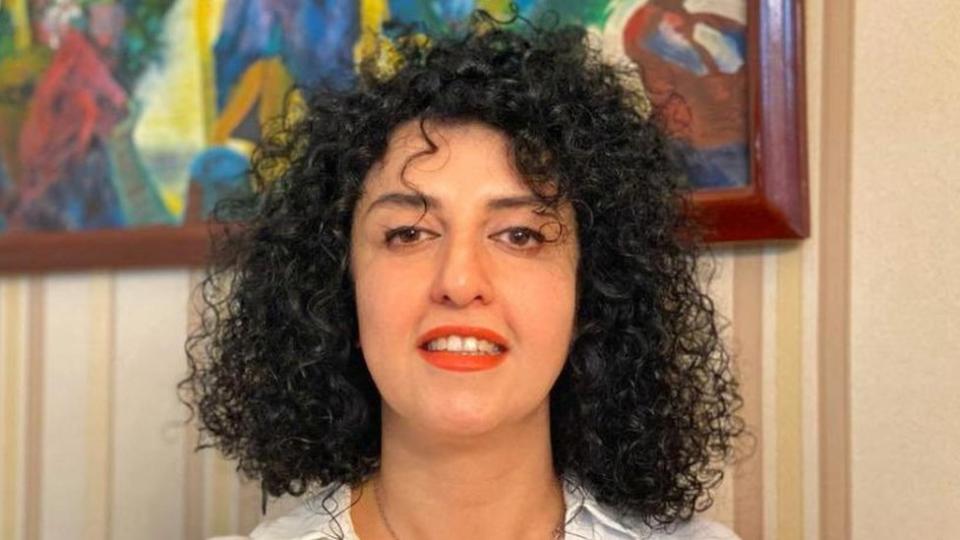The teenage twins of jailed Iranian activist Narges Mohammadi have accepted the Nobel Peace Prize on her behalf.
Ms Mohammadi – who is serving a 10-year jail term in Tehran – won this year’s prize for her work fighting against the oppression of women in Iran.
In a speech smuggled from prison and read out by her children, she denounced Iran’s “tyrannical” government.
“The Iranian people, with perseverance, will overcome repression and authoritarianism,” she said.
“Have no doubt, this is certain.”
The prestigious peace prize was handed out in Oslo on Sunday, along with the other Nobel prizes for literature, science and economics.
Ms Mohammadi has for years been a prominent human rights figure in Iran. The 51-year-old has been in jail almost continuously since 2010 – and in total has been arrested 13 times, convicted five times, and sentenced to a total of 31 years in prison.
She is currently in jail for “spreading propaganda”.
Her husband, political activist Taghi Rahmani, lives in exile in Paris with their two children and they have not seen one another for years.
In a speech smuggled out of Iran and delivered by her 17-year-old children Kiana and Ali Rahmani in French, Ms Mohammadi said: “I write this message from behind the high, cold walls of a prison.”
She praised young Iranians who she said have “transformed the streets and public spaces into a place of widespread civil resistance” – referring to the protests that began last year following the death of Mahsa Amini.
“The resistance is alive and the struggle is not weakening. Resistance and non-violence are our best strategies – it is the same difficult path that Iranians have walked until today, thanks to their historical consciousness and their collective will.”
The twins collected the prize – which includes a cheque for 11 million Swedish crowns (about £837,000, or $1m) – at a ceremony in Oslo’s City Hall attended by several hundred guests.
There was an empty chair on the podium between her children, to mark her absence.
On Saturday, Ms Mohammadi’s husband, Mr Rahmani, told BBC Hardtalk that his wife had once written a letter to their children expressing the hope “they would forgive her” for not being able to “be a mother to them”.
He said she was among a group of imprisoned human rights activists “standing up against the tyranny of the Islamic Republic”.
A month ago, Ms Mohammadi began a hunger strike in the notorious Evin prison where she is being held.
Speaking to Radio 4’s Today programme on Monday, Nazanin Zaghari-Ratcliffe – the British-Iranian national who spent six years in an Iranian jail accused of spying and who attended the ceremony in Oslo on Sunday – said Ms Mohammadi was an individual everyone relied on.
Ms Zaghari-Ratcliffe, who met Ms Mohammadi while in prison, said: “What she gave others was the support and the love and the peace of mind that you are going to be looked after the moment you enter this space.”
She said Ms Mohammadi was known for her kindness and how much she cared for people. “But I think more than that, one thing that if you have lived with Narges, you would know is, that Narges would live life to its fullest, with all its beauty, and at the same time she would choose to fight if she would want to… I think that’s remarkable.”

Iran’s foreign ministry previously said the Nobel award was “biased” and in line with “the interventionist and anti-Iran policies of some European countries”.
Also on Sunday, Norwegian author Jon Fosse is being awarded the Nobel Prize for Literature, while three scientists are receiving the Nobel Prize for Chemistry for their work in developing what are called quantum dots.
This year’s Nobel Prize in Physics has been awarded to Pierre Agostini, Ferenc Krausz and Anne L’Huillier, whose work demonstrated a way to create extremely short pulses of light that can be used to capture and study rapid processes inside atoms.


